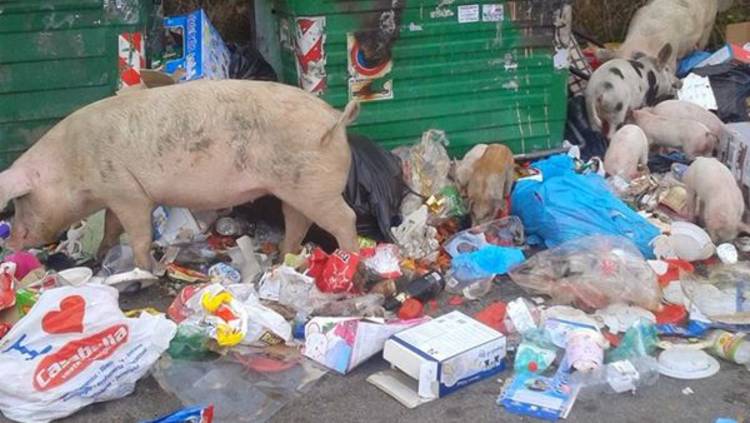


ROME -- The holidays are over but not the outrage in Rome over the huge piles of rubbish, worse than ever because of the Christmas season. Boxes, gift wrappings, food scraps, dirty diapers, bottles, old suitcases and more still litter the roads, including in the historical center. Tourists on Via del Corso [2]in the heart of Rome and on Via della Lungara in Trastevere [3]had to slalom their way past giant overflowing rubbish bins and piles of rubbish. One amateur photographer even spotted a pig having a nice sidewalk meal on Christmas Day.
This being the country that gave us Machiavelli, the rubbish also stinks of politics. The city administration of Rome, for the past year in the hands of the Movimento Cinque Stelle (M5S) [4], is being blamed. This is currently Italy's largest single political party, with almost 30% of the potential vote as the country plunges toward electons in March. The increase in rubbish during the holidays is normal, said Pinuccia Montanari of the M5S, who heads city council office for the environment. "The system for collecting rubbish has held up, and we intervened bringing the critical situations back to the normal," she declared last week. On Facebook her party reported that, "With respect to the holiday period last year, over 1,000 more tons of rubbish were collected and sent off for treatment."
While acknowledging that the rubbish situation is "critical," Rome Mayor Virginia Raggi [5]blames the previous administration, headed by mayor Ignazio Marino [6] of the Partito Democratico (PD), the party of former premier Matteo Renzi. She also blames Nicola Zingaretti, Lazio region governor, who has a past of association with the Partito Democratico (PD). At the same time, the PD president of Rome's 2s district, Francesca Del Bello, has invited citizens not to pay the annual rubbish tax called the Tari.
Behind the charges and counter-charges is the fact that Roman citizens, who normally produce 4,500 tons of refuse daily, during this holiday period have been chucking away some 5,000 tons a day -- far more than the median elsewhere in Italy. "If a Roman throws out 590 kilograms of refuse a year, in the rest of the country it is 480 kilos annually per person," according to La Stampa daily. The system is "already compromised system, so that, with just a few exceptional days, the bins are full and refuse is strewn all over the streets." At that point Gian Luca Galletti [7] of the PD, Minister for the Environment, stepped in, saying that, "The capital of Italy cannot permit an emergency on the lines of what we are seeing."
A crucial problem is that AMA, the company that manages rubbish removal in Rome, has been near bankruptcy. In addition, the high cost of conversion of garbage into useful materials via waste gasification for fuel and electricity have brought the system to a halt. It all used to be simple: 70,000 tons of Roman rubbish, unsorted, was sent by train twice weekly to Austria, where it was turned into power for homes there because Austria had a spare capacity at a waste-to-energy plant near Vienna. But in mid-December Austria turned back Roman garbage, which must now find a new incinerator. Under discussion: Tuscany, Reggio Emilia and the Abruzzo, but the costs are high. In the meantime, the rubbish remains in Rome.
So what can be done? Citizens can and should do their part, with careful recycling and making an effort to consume less plastic. A study conducted by the governmental agency for the environment, Istituto Superiore per la Protezione e la Ricerca Ambientale (ISPRA) [8], shows sharp distinctions among the regions. Worst in terms of production of refuse Venice and Florence, which throw out one-third more garbage than does Turin. Next top generators of garbage are Bari and Rome.
On the other hand, the tops for sorting paper, tin cans, plastic and organic waste. are Venice and Milan, both of which recycle over 57% of their waste, and Florence, over 50%. In Rome only 42% bother to recycle while trailing the pack is Palermo, barely 7%. The goal of 65% of the waste to be recycled remains distant. Sad to say, ISPRA itself has been at some risk of shutting down for lack of funds.
For its onlune report for 2017, see www.isprambiente.gov.it/it/newsletter-1/online-il-rapporto-rifiuti-speciali-edizione-2017 [9]
Source URL: http://newsite.iitaly.org/magazine/focus/facts-stories/article/rubbish-and-recycling
Links
[1] http://newsite.iitaly.org/files/xmasdaypig2jpg
[2] https://en.wikipedia.org/wiki/Via_del_Corso
[3] https://en.wikipedia.org/wiki/Trastevere
[4] https://en.wikipedia.org/wiki/Five_Star_Movement
[5] https://en.wikipedia.org/wiki/Virginia_Raggi
[6] https://en.wikipedia.org/wiki/Ignazio_Marino
[7] https://en.wikipedia.org/wiki/Gian_Luca_Galletti
[8] http://www.isprambiente.gov.it/en/ISPRA/the-institute
[9] http://www.isprambiente.gov.it/it/newsletter-1/online-il-rapporto-rifiuti-speciali-edizione-2017